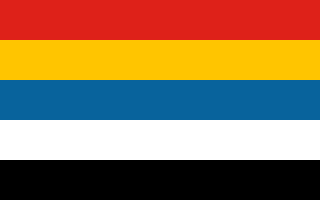Related Research Articles
A puppet state, puppet régime, puppet government or dummy government is a state that is de jure independent but de facto completely dependent upon an outside power and subject to its orders. Puppet states have nominal sovereignty, except that a foreign power effectively exercises control through economic or military support. By leaving a local government in existence the outside power evades all responsibility, while at the same time successfully paralysing the local government they tolerate.

A capital city or just capital is the municipality holding primary status in a country, state, province, department, or other subnational division, usually as its seat of the government. A capital is typically a city that physically encompasses the government's offices and meeting places; the status as capital is often designated by its law or constitution. In some jurisdictions, including several countries, different branches of government are in different settlements, sometimes meaning multiple official capitals. In some cases, a distinction is made between the official (constitutional) capital and the seat of government, which is in another place.
The seat of government is "the building, complex of buildings or the city from which a government exercises its authority".
A government-in-exile is a political group that claims to be the legitimate government of a sovereign state or semi-sovereign state, but is unable to exercise legal power and instead resides in a foreign country. Governments in exile usually plan to one day return to their native country and regain formal power. A government in exile differs from a rump state in the sense that the latter controls at least part of its former territory. For example, during World War I, nearly all of Belgium was occupied by Germany, but Belgium and its allies held on to a small slice in the country's west. A government in exile, in contrast, has lost all its territory. However, in practice the difference might be minor; in the above example, the Belgian government at Sainte-Adresse was located in French territory and acted as a government in exile for most practical purposes.
A provisional government, also called an interim government, an emergency government, a transitional government or provisional leadership, is a temporary government formed to manage a period of transition, often following state collapse. Provisional governments are generally appointed, and frequently arise, either during or after civil or foreign wars, or during difficult times such as during invasion, economic crisis, or widespread infiltration of saboteurs and counter-revolutionaries such as during the French Revolution.

The Russian Republic, referred to as the Russian Democratic Federal Republic in the 1918 Constitution, was a short-lived state which controlled, de jure, the territory of the former Russian Empire after its proclamation by the Russian Provisional Government on 1 September 1917 in a decree signed by Alexander Kerensky as Minister-Chairman and Alexander Zarudny as Minister of Justice.
An exclusive mandate is a government's assertion of its legitimate authority over a certain territory, part of which another government controls with stable, de facto sovereignty. It is also known as a claim to sole representation or an exclusive authority claim. The concept was particularly important during the Cold War period when a number of states were divided on ideological grounds.

The Government of the Republic of China, is the national authority whose actual-controlled territory consists of main island of Taiwan (Formosa), Penghu, Kinmen, Matsu, and other island groups, collectively known as Taiwan Area or Free Area. A unitary state, the ROC government, under the current constitutional amendments, is run by a de facto semi-presidential system, consists of the presidency and five branches (Yuan): the Executive Yuan, Legislative Yuan, Judicial Yuan, Examination Yuan, and Control Yuan. The president is the head of state, with the premier as the head of government, currently ruled by the Democratic Progressive Party (DPP) since 2016. Since the 2005 amendments of the Additional Articles of the Constitution, the Legislative Yuan has been the de facto unicameral parliamentary body of the country.

The Yemeni civil warof 1994, also known as the 1994 Summer War, was a civil war fought between the two Yemeni forces of the pro-union northern and the socialist separatist southern Yemeni states and their supporters. The war resulted in the defeat of the southern separatists and the reunification of Yemen, and the flight into exile of many leaders of the Yemeni Socialist Party (YSP) and other separatists.

The Republic of China (ROC), or simply China, was a sovereign state based on mainland China from 1912 to 1949 prior to the government's relocation to Taiwan, where it continues to be based today. The ROC was established on 1 January 1912 during the Xinhai Revolution against the Qing dynasty, ending the imperial history of China. The Republican government was ruled by the Kuomintang (KMT) as a one-party state based in Nanjing from 1927, until its flight to Taipei on 7 December 1949 following the KMT's de facto defeat by the Chinese Communist Party (CCP) in the Chinese Civil War. The CCP proclaimed the People's Republic of China on 1 October 1949, while the ROC retains control over the "Free Area", with the political status of Taiwan remaining in dispute to this day.

The Ukrainian People's Republic (UPR) was a short-lived state in Eastern Europe. Prior to its proclamation, the Central Council of Ukraine was elected in March 1917 as a result of the February Revolution, and in June, it declared Ukrainian autonomy within Russia. Its autonomy was later recognized by the Russian Provisional Government. Following the October Revolution, the Central Council of Ukraine denounced the Bolshevik seizure of power and proclaimed the Ukrainian People's Republic with a territory including the area of approximately eight Russian imperial governorates. It formally declared its independence from Russia on 22 January 1918.

The All-Palestine Protectorate, also known as All-Palestine, the Gaza Protectorate or the Gaza Strip, was a short-lived client state with limited recognition, corresponding to the area of the modern Gaza Strip, that was established in the area captured by the Kingdom of Egypt during the 1948 Arab–Israeli War and allowed to run as a protectorate under the All-Palestine Government. The Protectorate was declared on 22 September 1948 in Gaza City, and the All-Palestine Government was formed. The President of the Gaza-seated administration was Hajj Amin al-Husseini, the former chairman of the Arab Higher Committee, while the Prime Minister was Ahmed Hilmi Pasha. In December 1948, just three months after the declaration, the All-Palestine Government was relocated to Cairo and was never allowed to return to Gaza, making it a government in exile. With a further resolution of the Arab League to put the Gaza Strip under the official protection of Egypt in 1952, the All-Palestine Government was gradually stripped of its authority. In 1953, the government was nominally dissolved, though the Palestinian Prime Minister, Hilmi Pasha, continued to attend Arab League meetings on its behalf. In 1959, the protectorate was de jure merged into the United Arab Republic, while de facto turning Gaza into a military occupation area of Egypt.
References
- Jackson, Julian T. (2001). France: The Dark Years, 1940–1944 . Oxford University Press. ISBN 978-0-19-820706-1 . Retrieved 15 August 2020.